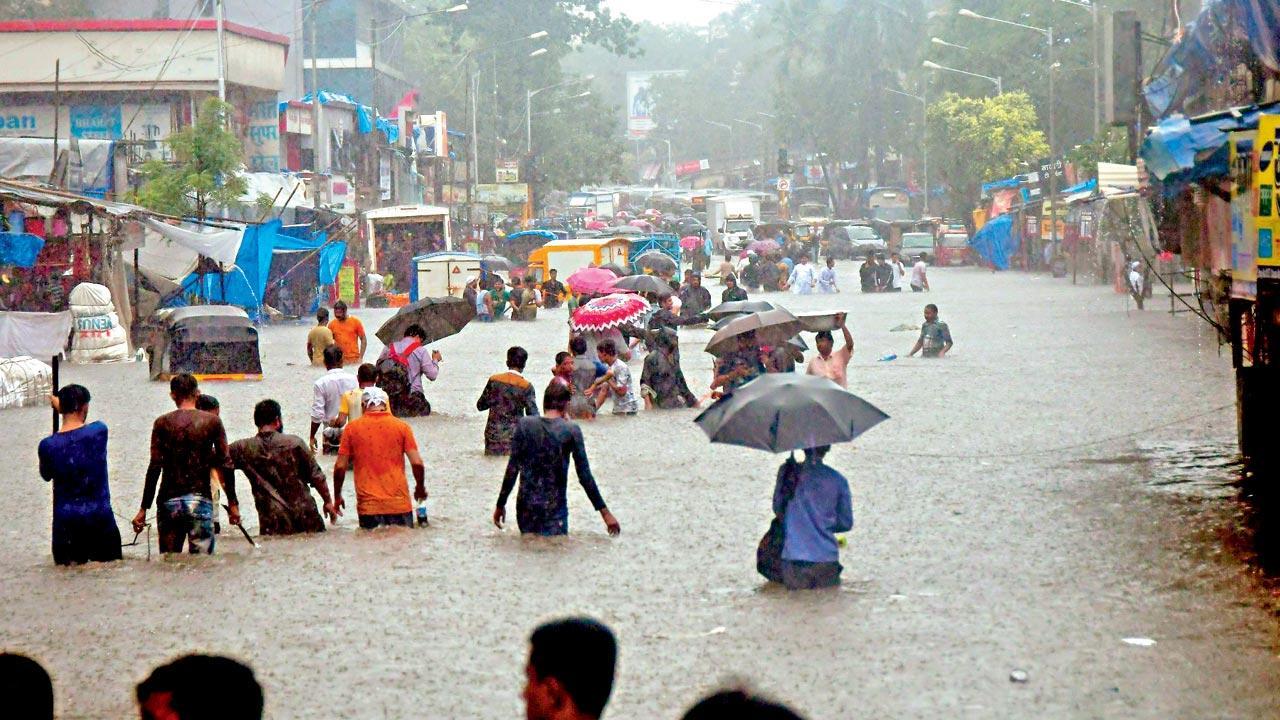Flood risk looms over 35 per cent of city’s residents; civic body identifies hotspots in its inaugural climate budget report

Heavy rain tends to lead to waterlogging at SV Road, Amboli, Andheri West. File pic/Sayyed Sameer Abedi
Approximately 35 per cent of the city's population resides in flood-prone areas, as per data from Mumbai's inaugural climate budget report for 2024-25 released by the Brihanmumbai Municipal Corporation (BMC) on World Environment Day. The BMC has pinpointed 100 flooding hotspots across the city.
The report highlights that 35 per cent of the population dwells within 250 square metres of these flood-prone zones. As per the budget, an allocation of Rs 10,224.24 crore has been assigned for climate-relevant initiatives, and it constitutes 32.18 per cent of the total capital expenditure budget of Rs 31,774.59 crore. This budget is integrated into the existing financial framework announced in February and aims to address five key climate risks identified by the BMC: urban heat, urban flooding, landslides, coastal risks and air pollution.
Additional Municipal Commissioner Ashwini Joshi said, “An extra Rs 2,163.8 crore has been earmarked for initiatives aligning with certain aspects of the Mumbai Climate Action Plan (MCAP). These include implementing LED lighting, greenery projects, rooftop solar installations, and sewage treatment facilities in new buildings, aiming to transform Mumbai into a net-zero and climate-resilient city in the foreseeable future.
“The stormwater drainage, sewerage initiatives, the Mumbai sewage Disposal project, water supply endeavours, and the solid waste management departments are intricately connected to environmental concerns. The main aim of this budget is to promote and prioritise eco-friendly projects managed by these departments,” Joshi added.
The BMC aims to achieve net zero greenhouse gas emissions by 2050. Interim targets include a 30 per cent reduction by 2030 and a 44 per cent reduction by 2040, based on 2019 levels. Without action, emissions could increase by 170 per cent between 2019 and 2050. The most ambitious yet feasible plan for Mumbai predicts a 27 per cent reduction in emissions by 2030 and a 72 per cent reduction by 2050. To address flooding, the budget document highlights initiatives such as drain cleaning, box drain construction, building pumping stations, and installing floodgates.
“It is everyone's responsibility to be environmentally conscious. As a civic body, BMC is acutely aware of this duty. In line with the Paris Agreement on climate change, it is essential to develop diverse, environment-friendly infrastructure. The municipal administration has proactively taken steps in this direction through the climate budget report,” said Additional Municipal Commissioner Dr Ashwini Joshi.
Rs 10,224.24cr
Budget assigned for climate-relevant initiatives
Budget allocation
Urban flooding and water resources management: Rs9,707 cr
Energy and building: Rs 32.47 cr
Integrated mobility: Rs 8.40 cr
Sustainable waste management: Rs 262 cr
Urban greening and biodiversity: Rs 177 cr
Air quality management: Rs 35 cr
 Subscribe today by clicking the link and stay updated with the latest news!" Click here!
Subscribe today by clicking the link and stay updated with the latest news!" Click here!










